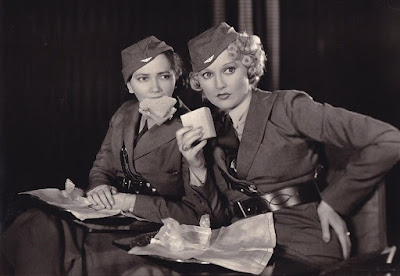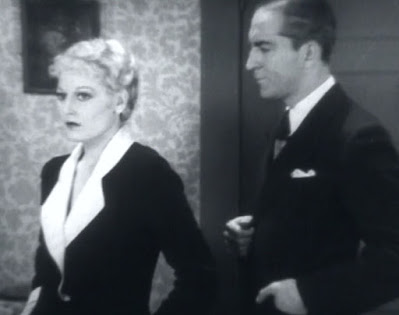Starring: Roland Young, Charles Ruggles, Thelma Todd, Lila Damita, Cary Grant, and Irving Bacon
Director: Frank Tuttle
Rating: Six of Ten Stars
To cover up the affair between his friend Gerald (Young) and the wife (Todd) of an Olympic athlete (Grant), , and to allow them to continue to carry on, Bunny (Ruggles) arranges for an actress (Damita) to pose as Gerald's wife.
"This is the Night" is an amusing film that, to the modern lover of old movies, is remarkable primarily because it's the great Cary Grant's very first screen appearance. He is part of a cast made entirely of great performers, and his charm and screen presence leaps off the screen, even as he shares scenes with actors who also have strong presences as well as a lot more experience in the film medium, like Thelma Todd and Charles Ruggles.
Interestingly, Grant's charisma is actually an element that works against this film rather than for it. Grant's character, Stephen, is presented in dialogue that he is supposed to be menacing. Not only does his status as an Olympic Games-level javelin thrower worry Gerald, but Thelma Todd's character, Claire, implies that Stephen is a jealous fiend who beats her. None of this rings true, because even at his most suspicious and jealous and angry over being played for a fool while his wife carries on her extra-marital affair (or attempts to), Stephen comes across at most sardonic. Later in his career, Grant ably brought menace to his charm--in "Notorious" and "Charade" to mention two examples)--but at this point, his acting skills weren't developed to that point.
The lack of menace that Grant brings to Stephen's character undermined the central premise of the film for me: That Claire would be interested in Gerald over Stephen. Both men appear to be wealthy and urbane, but Stephen is far more handsome than Gerald, not to mention a world-class athlete and smart enough to be fluent in at least three different languages. I may not know what a woman wants in man, but seriously? What woman would choose Roland Young over Cary Grant, even if everything else but looks was equal?
While I can imagine that Claire would step out (or stay in) with Gerald when Stephen is away on one of his many trips, I can't imagine that she'd bother to attempt to carry on her affair with Gerald once they've almost been caught. Her jealousy over Gerald's fake wife therefore seems even more unbelievable to me; Stephen is clearly the keeper--even if he has an annoying habit of singing at random times--depending on how serious his mean/violent streak is.
Ultimately, though, this hardly matters, because everything about this film is good-natured, with the characters strolling in and out of rooms while constantly quipping and engaging in light slapstick humor. (There's a running gag with Gerald's manservant inadvertently causing Clair to be near-naked in pubic--although, alas-alack, we viewers never get to see Todd in her unmentionables in this one, despite the fact she was regularly parading around in them in the short comedies she was making for the Hal Roach Studio around this time.) Making the audience laugh seem to be the main motivating factor in how this film is constructed, and by the time it's over, all of its events add up to little more than lighthearted nonsense... and since I had the feeling there were no aspirations beyond that, I felt perfectly fine with that.
While "This is the Night" is certainly worth watching for Cary Grant fans, it is equally worthwhile for anyone who just enjoys fine comedic performances. Charles Ruggles and Thelma Todd are in particular fine form here--Todd is the closest thing this film has to a villain, and she's fantastic; Ruggles is alternatively the funniest clown in the picture, or the most sympathetic character, and he is perfect in every scene.
As for the top-billed stars of the film, Roland Young and Lila Damita, they were consistently outshone by the supporting cast. In Young's case, it was because everyone else had better lines and better jokes (in addition to the fact that it was unbelievable that Todd would be pursuing his character over Grant's), but with Damita, it was an issue of screen presence. She wasn't a bad actress, and she was certainly pretty, but she just didn't have the ability to command the screen the way even neophyte Cary Grant did. (This actually seems to be a common observation I make about these 1930s romantic comedies; the characters around whom the story supposedly revolves are often the least interesting ones, performed by the blandest of actors and actresses. The latter isn't the case here, but the former certainly is.)
"This is the Night" is fast-paced and very funny. It kept me entertained from beginning to end, and it would have gotten a Seven of Ten Star-rating if not for two very distracting things. First, most outdoor night scenes are tinted blue, possibly to show that romance was afoot, but to me it was just annoying. Second, there's a scene where Young locks Damita in her bedroom... and then a few minutes later demands that she unlock the door, or he's going to break it down. He had just locked the door, the key should still be in the lock since he didn't appear to take it--and despite my granting that this film is just a bunch of fluffy nonsense that's an error so glaring that it was the final factor that pushed it from a Seven to a Six.
Nonetheless, fans of Thelma Todd, Charles Ruggles, and Cary Grant will find the time spent watching "This is the Night" to be time well spent.
















































.jpg)






.jpg)
